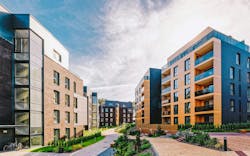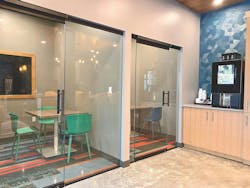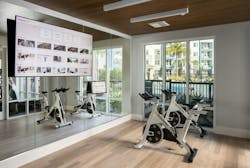Acing your multifamily housing amenities for the modern renter
By Quinn Purcell, Managing Editor
Eighty-seven percent of residents consider amenities when signing or renewing a lease. That is, according to market research by Joe Duffus, CEO of Builders Design, and Justin Bucy, director at Housing Design Matters.
Based on market research and trends, Duffus and Bucy shared some primary areas of focus for multifamily amenities during their presentation at the 2023 International Builders’ Show. Whether it’s picking interior design elements or catering to your target demographic, here’s what their research has found.
3 important focus areas for amenities
In order to attract modern tenants, you need spaces that function for their preferred way of life.
1. Remote work
It’s not going away anytime soon. According to McKinsey data, nearly 60% of people work from home at least one day a week.
Remote work amenities could be anything from workspaces to meeting rooms and “Zoom booths.” It could be as simple as having minimalist workstations in a designated co-working space, as long as the design is inviting and functional (high-speed internet is a must). No one wants to sit and look at a blank wall—they can do that at home.
With the variety of careers going fully remote, Bucy has even seen podcasting/recording studios emerge in the multifamily space.
2. Relaxation and personal wellness
Water features, gardens, and meditative spaces can help residents up their relaxation game, making them feel even more at home. Whether it’s a simple outdoor fountain that provides calming white noise, or a tucked-away library for needed quiet time, amenities that promote relaxation can help retain tenants each and every year.
On the other hand, dedicated fitness centers are also essential for resident wellness—but long gone are the days of minimal equipment in a cramped room. Depending on your target demographic, choose between free weights or weight machines (or even both) as long as you maintain adequate, clear floor space. Consider using a fitness consultant to help layout and optimize the room.
Also, keep in mind the various ways people exercise: yoga, stretching, aerobics, etc. If possible, implement space for such alternative activities in your fitness room.
3. Outdoor spaces
Community fire pits/grills, lounging areas, hiking trails, or pools offer residents the chance to socialize day and night. With modern technology, you can implement a simple, sleek fire table that’s both easy to operate and functional in tighter spaces. And don’t sleep on rope lights—they can help define and elevate any outdoor area. Bucy emphasizes the inclusion of covered outdoor spaces as well, citing his firm’s 20% increase in the feature as of late.
Bonus amenity considerations
After nailing these focus areas, Duffus and Bucy suggest improving upon your development further.
- Community cultivation. Look for a chance to create communities with your attractive amenities. Consider your target market and let it influence your design choices. A gathering space could be designed as a bar/lounge for the younger crowd, or as a sleek kitchen-like common room for elegant types. Bucy also sees opportunities for creating community through flex room design. Give it a theme—maybe with wine or scotch lockers—to spur engagement and connectivity.
- Package/mail room. Bucy finds that for the mail room and package receptacles, you only need to provide enough parcel lockers for about 30% – 40% of units.
- Pet amenities. According to Bucy, the Covid-19 pandemic led to a record number of pet adoptions. Subsequently, dog parks and washing stations are in the highest demand. With pet spas and washing stations, he’s found the most success in keeping them away from community spaces. Group these pet rooms closer to maintenance/pool equipment areas. Your tenants—and their noses—will thank you.


